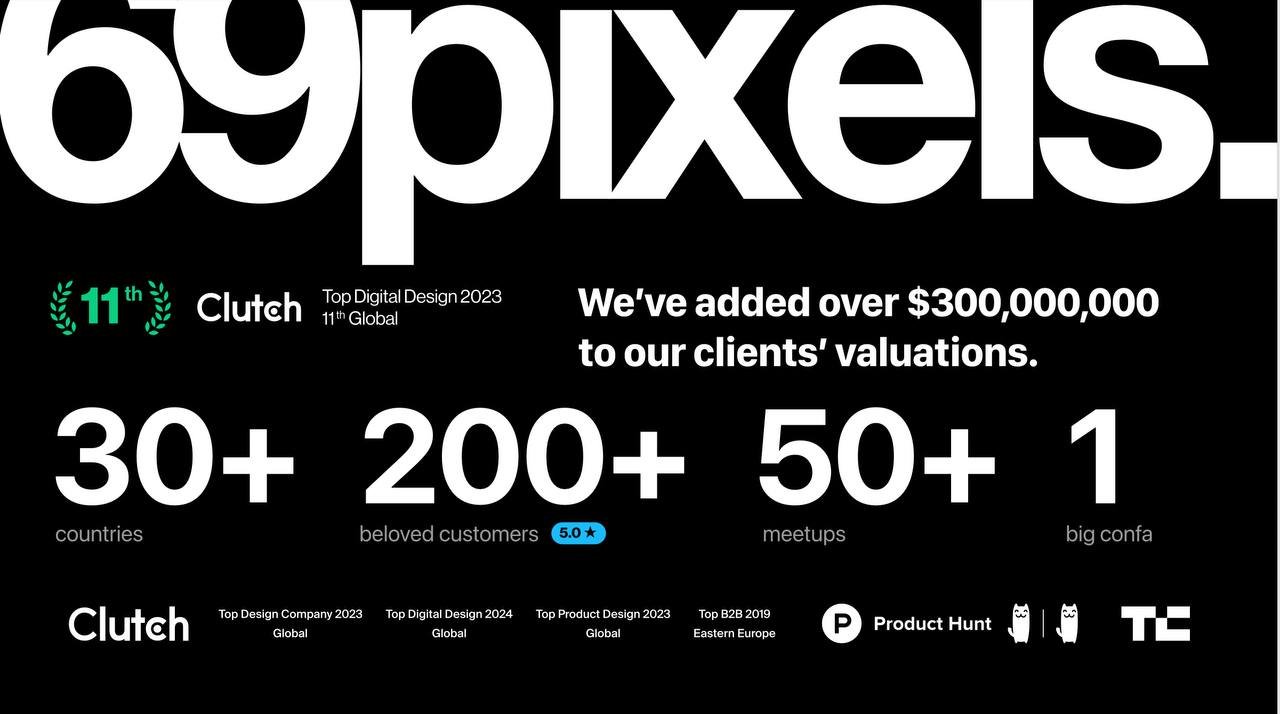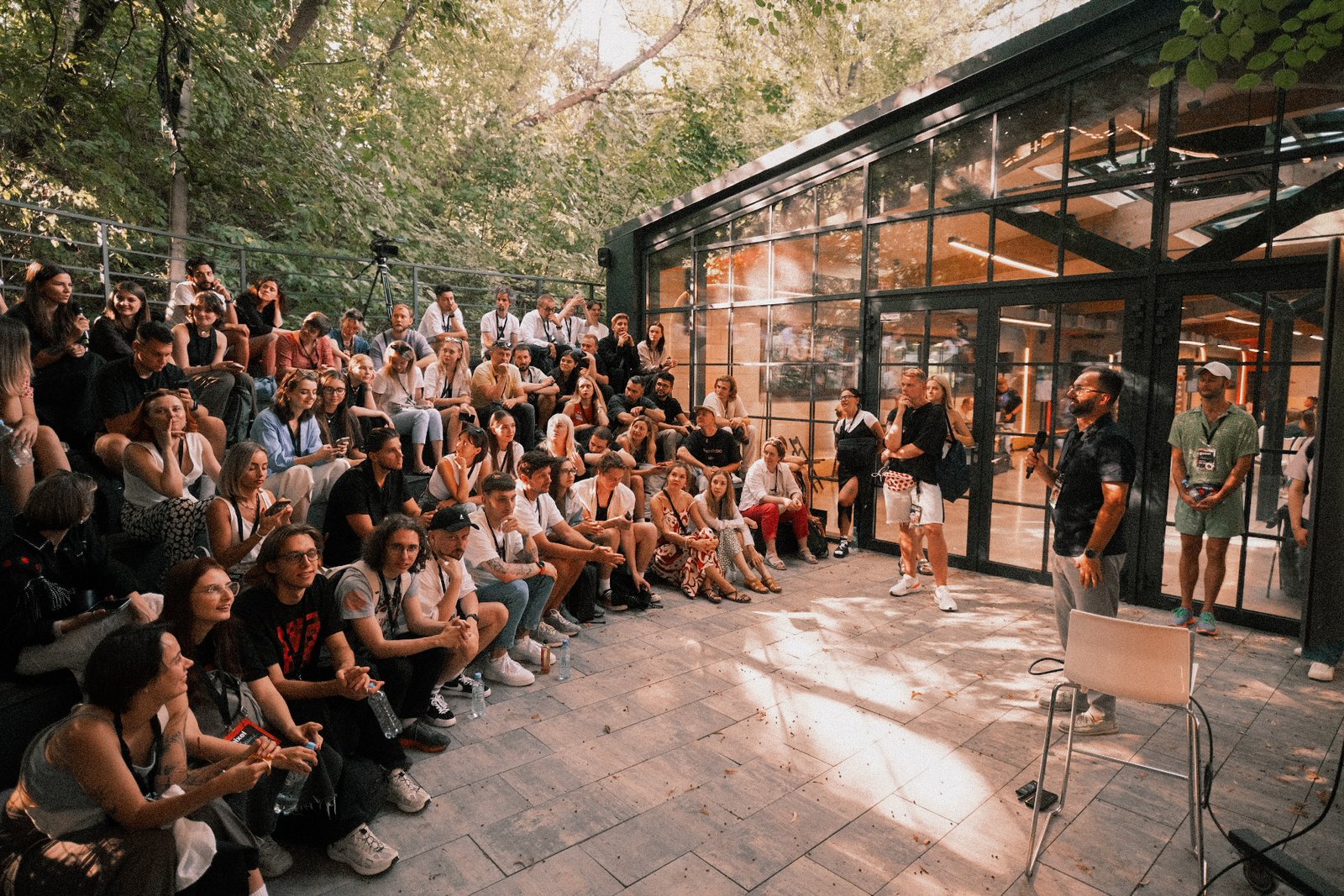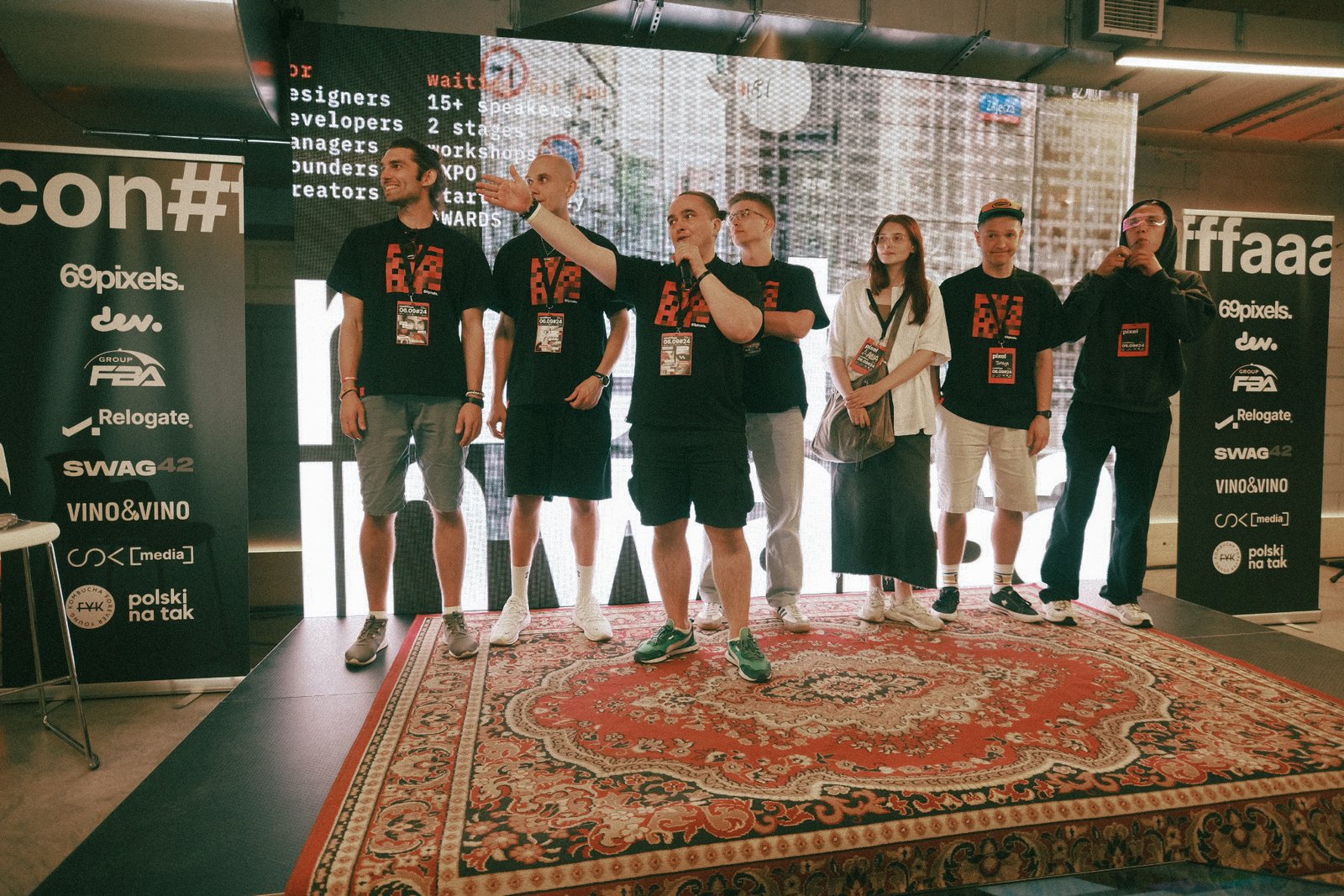Just weeks after hosting 69 BPM, Cyprus’s first design-led techno masquerade at The Rooms, Limassol, complete with black-and-white masquerades, secret rooms, live podcasts, and a rooftop bar that pulsed until late, 69pixels Studio is proving that world-class design doesn’t live only on screens. It lives in the connections formed offline, in the laughter between dance moves, in conversations over whiskey at a founder’s meetup, in the trust built when creatives gather, to share. To build community.
The Limassol-based studio, co-founded by Alexey Bavdey (CDO) and Ilya Hets (CEO), has earned global recognition: has earned global recognition: ranked #11 worldwide design studio, winner of two Golden Kitty Awards, and Readymag finalist, a project the founders describe as “built by designers, for designers.”igners, for designers.”
Follow THE FUTURE on LinkedIn, Facebook, Instagram, X and Telegram
But their real distinction lies in their philosophy. Design, to them, isn’t decorative but a growth engine, a cultural catalyst, and a discipline that serves both business and the world at large. From opening a studio in Minsk with $2,000 and two used Macs, they’ve built a full-stack creative powerhouse serving startups and scaleups across 30 countries.

In this interview with The Future Media, Alexey and Ilya reveal how a drift-racing inside joke became a globally respected brand, why “every pixel matters,” and how Cyprus became the unlikely home for a studio reshaping digital culture from the Eastern Mediterranean outward.
Could you begin by telling us a bit about your background and what drew you to product and design?
Alexey: I came to the digital world through architecture. I always believed you could become a designer if you studied architecture, but not the reverse. So, I tried to kill two birds with one stone. Architecture taught me how to hold aesthetics and function in the same hand, and that discipline still guides my everyday work.
After finishing my studies in Belarus in 2011, I moved to Milan to specialize in Digital Design. Post-graduation, I took the role of Lead Designer at Nival. I then moved to Wargaming, where I was head of the art direction of the R&D group. We experimented with bold, sometimes downright crazy, product concepts.
Ilya: As for me, this might sound cocky, but I didn’t chase design; design found me. My background is in business. I hold a Master’s degree in Economics and an MBA. My career began in sales, where I led regions and closed big accounts. I was selling outsourced workwear services. The work was unsexy, but I can’t complain: it was a masterclass in B2B sales and operations. Life was comfortable: great salary, company car, corporate travel, clear career ladder — head of sales next year, director after that.
Alexey: In parallel with all my design jobs, I ran a drift team called Team 69 and even built a practice track called “Ring 69.” Soon after, I launched 69pixels design studio. Originally, I envisioned it as a design studio for motorsport.
Ilya: While I was on my predictable career path, one day, some random “Alexey” messaged me out of the blue on VK with this message: “I’m starting a design studio. Come build it with me.” We met on the outskirts of Minsk, spent an evening talking (and by talking I mean in the typical Eastern European fashion: sauna, whiskey, black bread, and salo), and shook on it. I told him I wouldn’t join as an employee, only as a partner. He agreed. The next day, we registered the company, 69pixels.
Alexey: Why “69”? The shape of the number looks like a racetrack from above, which makes a good story. But, honestly, it was a deliberate branding move. People don’t remember “Studio 54” unless the studio does something legendary, and “Studio 73” is easy to mix up with 72 or 74. But the number “69” sticks in people’s heads.
Ilya: I brought the commercial backbone — finance, legal, operations, sales — and we built a studio that treats creativity like a business function, not a mood board. We started with almost nothing: $2,000 each. We bought two used Macs, seven used desks, rented a tiny office wedged between bathroom showrooms, and hired two designers… and got zero clients. But we all have to start somewhere.
What problem did you see in the design sector that convinced you to start 69 Studio?
Ilya: Honestly, it wasn’t about design at first — it was about business. Sales was my world, and I’ve always believed the approach is universal. I was 24, had a strong résumé, and a stable corporate career ahead of me. I thought I could always get another job, so I decided to take the risk and start my own business. It was a “now-or-never” moment. Whether it would be design, coffins, or construction didn’t matter — what mattered was building something of our own.
Alexey: For me, it was a bit different. Around that time, I saw a gap in our region. There were a lot of talented designers, but most of them were working for Europe and the U.S., while the local market was completely ignored. My goal was to raise the design bar at home and help local companies present themselves on a world-class level. My goal was to prove that design isn’t just decoration, it’s a growth driver.
Ilya: When we were first starting, we didn’t have any clients or even a network. So, we decided to go the other way and create demand. We researched big local companies, found their pain points, and built full presentations showing how to fix them, complete with mockups and UX concepts. That’s how we landed our first big client, Euroopt — one of the largest retail chains in Belarus — just two months after launch. I still remember that first meeting: twenty executives in total silence until the CEO literally jumped up, excited like a child. That’s when we knew we could compete at the top level.

Alexey: We began by building a community: hosting meetups, sharing our processes publicly, and growing a culture around our studio. Bit by bit, we “re-dressed” local brands so they may present more professionally. The combination of craft and education became the DNA of 69pixels. At the same time, many Belarus-based companies were building for global markets, which naturally drew us into designing for international brands as well. What started as a small studio serving motorsport enthusiasts gradually transformed into a full-spectrum design partner for startups and scaleups worldwide.
In your own words, what is 69 Studio’s mission?
Alexey: We see 69 Studio as a cultural agent, bridging Limassol, Warsaw, and New York. We connect founders to their users and shape how their products enter the world. Our mission is to elevate every digital landscape we touch. That means teaching, raising standards, and delivering products and brands that feel inevitable.
Ilya: For me, it’s even simpler. I often ask myself one question: if we do our job well, does the world become better or worse? And the answer I get is that when we do our job really well, the world becomes better. It becomes more understandable, more functional, and more attractive.
Alexey:
That’s why our motto is Every Pixel Matters. It’s not just a slogan. It’s how we work, detail by detail, decision by decision.
Ilya: That’s what makes us different. We’re not chasing trends; we’re trying to make things that genuinely make sense — for people, for business, for the world.
What does 69 Studio offer today in terms of services and engagement models?
Alexey: 69 Studio is full-stack across brand and product: strategy, identity, UX/UI, motion, and development. But what matters most isn’t the list of services, it’s how we work. Nothing we do is templated or off the shelf. Every project starts from scratch, because every client’s context is unique.
Ilya: What’s interesting is how the market responds to readiness. For years, we only focused on product design and got almost no branding inquiries. The moment we built a proper branding team, invested in that direction, and started showcasing those capabilities, branding projects started flooding in. We didn’t even change our marketing — it was like the universe just started sending us that kind of work.
We’ve grown into a serious, world-class team, both in size and in quality. Ironically, the turbulence of recent years — COVID, the war, and all the chaos — helped us attract incredible talent we never imagined would work with us. Designers who, a few years ago, felt out of reach are now part of our team.
Alexey: The same thing happened with development. After years of focusing on design, we decided to build our own in-house development division through a strong engineering network. Now about a third of our projects are end-to-end — from brand to product to build.
Ilya: It’s also funny that for nine years we ran the studio almost entirely on word of mouth. We hadn’t spent a single dollar on marketing until this summer. All our clients came through referrals or direct cold outreach. Only now are we finally investing in brand awareness — to match the scale we’ve already reached organically.
Alexey: Today, the business is roughly balanced — one-third interface design, one-third branding, one-third development. And what keeps it growing is not expansion for its own sake, but the way each new capability amplifies the others.
Who are your clients at the moment, and what kinds of challenges do they bring to you?
Ilya: From the very beginning, we made a deliberate decision not to limit our work to Belarus, Russia, or the CIS. We wanted to build globally — and that paid off. Two guys from Minsk now work with clients in more than 30 countries, mainly in the U.S., Cyprus, and Europe.
Alexey: We’ve collaborated with over 200 startups and larger businesses across different verticals: wellness, crypto, fintech, edtech, entertainment, you name it. The consistent challenge is always the same: turn complex stories into brands and interfaces that convert.
What sets your approach apart when you design products and brand systems for founders and scaleups?
Ilya:
For us, design isn’t about making things beautiful. It’s about solving problems. Good design drives business metrics; it helps clients earn more, convert better, and scale faster. In a world where everything is measurable, results speak louder than aesthetics.
That’s why we treat every project as if it were our own product. Sometimes, even better, because our clients’ launches often get more attention than our own website, which we haven’t had time to update for years. That level of ownership always shows, both in results and in long-term loyalty.
Alexey: Methodologically, our process is flexible by design. We draw on research, UX testing, and the latest stacks, but we never apply it mechanically. Every project is unique, so the process adapts to the problem, not the other way around. We rely on collective intelligence inside the studio. Each project is reviewed by ten pairs of eyes. That kind of critique adds depth you can’t get from one art director. Our clients don’t get “one designer,” they get the sum of our entire team’s experience.
Your website notes that clients supported by your work have collectively raised hundreds of millions of dollars. Which recent project best shows business impact, and what measurable result can you share?
Alexey: A recent example is Skich — a product nurtured by members of our team and backed by a leading gaming fund. Our work spanned brand and product, and the company has advanced toward its next round at a significantly higher valuation. Of course, design doesn’t close a round alone, but it does shape the story that attracts investment.
Ilya: Honestly, there’s no better case than Skiсh. It’s the project I’m most proud of, not just because of the results, but because it was born inside our studio. Two of our designers started it as a side project while working at 69pixels. We supported them, helped with design, strategy, and storytelling — and they turned it into a venture-backed product now growing fast in the global market.
That, to me, is the ultimate measure of success. It’s one thing to help clients raise money or scale, and we’ve done plenty of that. But when your internal culture produces founders, when people inside your studio take what they’ve learned and build something real, that’s next-level impact.
How do you select and develop your team?
Alexey: Selecting and developing our team is one of the hardest — and most important — things we do. We always look for potential first. Even if a designer’s portfolio isn’t full of shiny awards, an experienced art director can spot the spark of real talent. We care less about what someone has done and more about what they can do with us.
Ilya: We look for people who became designers not for the money, but because they simply can’t imagine doing anything else. Curiosity, logic, and a bit of rebellion are the traits we value most. Talent is great, but mindset matters more.

Alexey: We’re lucky to have a strong reputation. We get about a hundred unsolicited applications every month. We’ve never used recruiters; people come directly to us. That’s flattering, but also a challenge; spotting the true stars in that flow takes time.
Ilya: And the result shows. After a year or two at 69pixels, our designers often get hired by top global companies. It’s the kind of “loss” you’re actually proud of.
Alexey: Once inside, we invest in growth: sports, English classes, workshops, book clubs, and freedom to run side projects. If someone has a product idea, we help them build it. A great example is Skich — it started as a side project by two of our designers, and with our support, it became a real venture-backed startup.
How are you engaging with the Cyprus ecosystem, and where could collaboration with local startups or universities be most useful?
Ilya: What amazed me about Cyprus is how much people here genuinely give back to the island. Doing something good for the place you live, quietly and without expecting anything in return, is completely normal here. You see it everywhere: people planting trees, cleaning beaches, and building free tools for the community. It’s inspiring.
Alexey: There’s a real sense of responsibility, both personal and professional. We try to stay involved by mentoring, judging, and contributing design to local initiatives.
Ilya: We also want to give back in our own way. Cyprus has given us a lot, and now we’re working on a project to create a brand for the island that explains why it’s such a great place to live, build, and do business. Through design, we want to help Cyprus tell its story with meaning.
Alexey: And we’re building more community around design and startups here. We’ve hosted events like The Ventures and 69BPM, with talks, critiques, and workshops. The goal is to make Cyprus a real hub where creative and tech people can meet and collaborate.
Ilya: We also held our first big event recently, and it wasn’t a typical tech meetup. It was about real connection, inspiration, and fun. It worked beautifully, thanks to our amazing CMO, Max Kaltaniuk, who made it all happen.

Alexey: We also believe universities could become strong partners by connecting research with real product design. There’s a lot of potential in that.
Ilya: And yes, that brand concept for Cyprus is already in the works.
Alexey: But for now, it’s a secret.
Looking ahead two years, what are your priorities for 69 Studio, and what impact do you want to create for clients and the global design community?
Ilya: Honestly, beyond all the talk about AI, our main goal is to transform from a pure service studio into a service-and-product company. That’s the next big step I’m dreaming about for the coming years.
Alexey: I’d say we have three priorities. First, to deepen our branding expertise. Second, to integrate AI tools into our processes. And third, to grow the community through events and education.
We’re also putting more energy into our own projects. With the experience we’ve gathered, it’s only a matter of time before we launch something that carries our name directly — maybe an app, a design tool, or something entirely new.
Ilya: At the same time, 69pixels has already become more than just a company. It’s a brand in its own right, strong enough to expand into new areas: products, ventures, maybe even standalone business units. That kind of growth feels natural for us.
Alexey: For clients, our goal is to create measurable results. We want to help them grow their brands, build products that retain users, and empower teams that move faster. For the community, it’s about raising standards. We want to keep teaching what good design looks like and how to get there. And for ourselves, it’s about designing more, mentoring new designers, and pushing the industry forward. We want to make the world around us a little better.
Ilya: Where there are pixels, there are opportunities for change and trust. Because… Every. Pixel. Matters.












